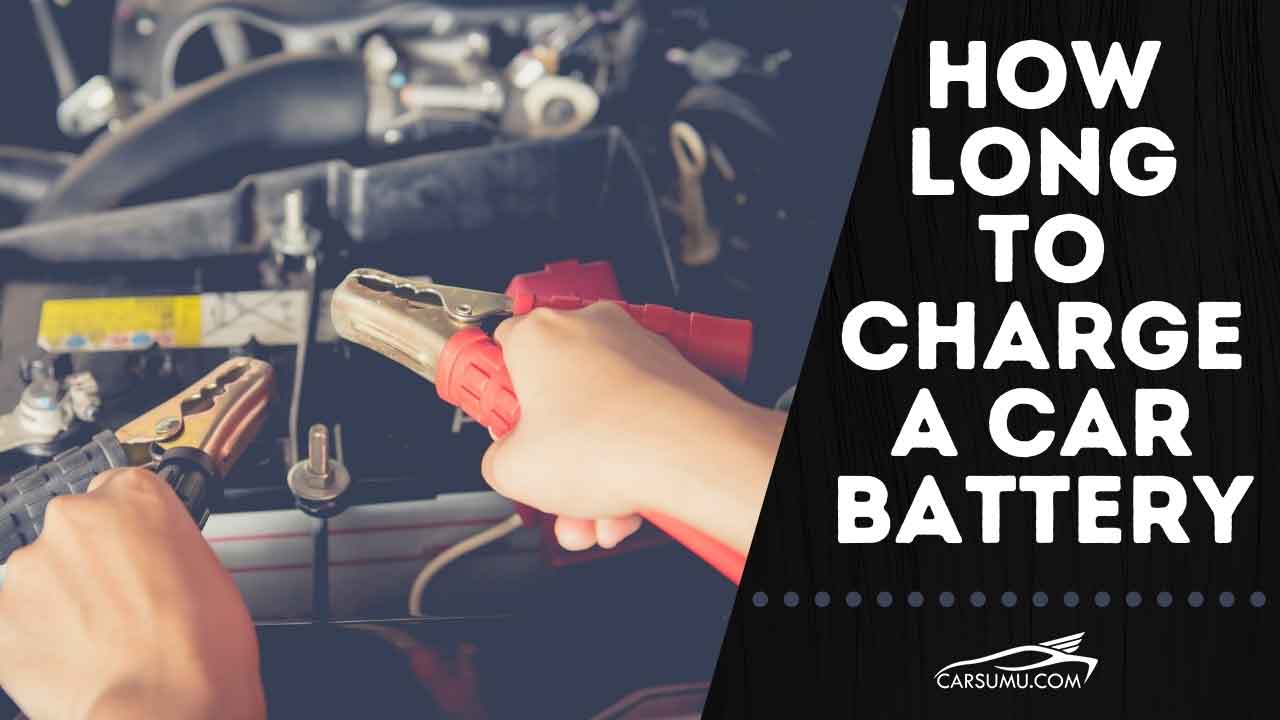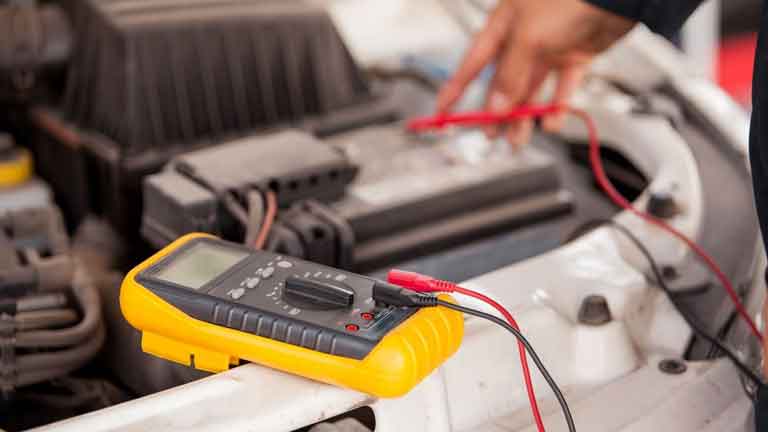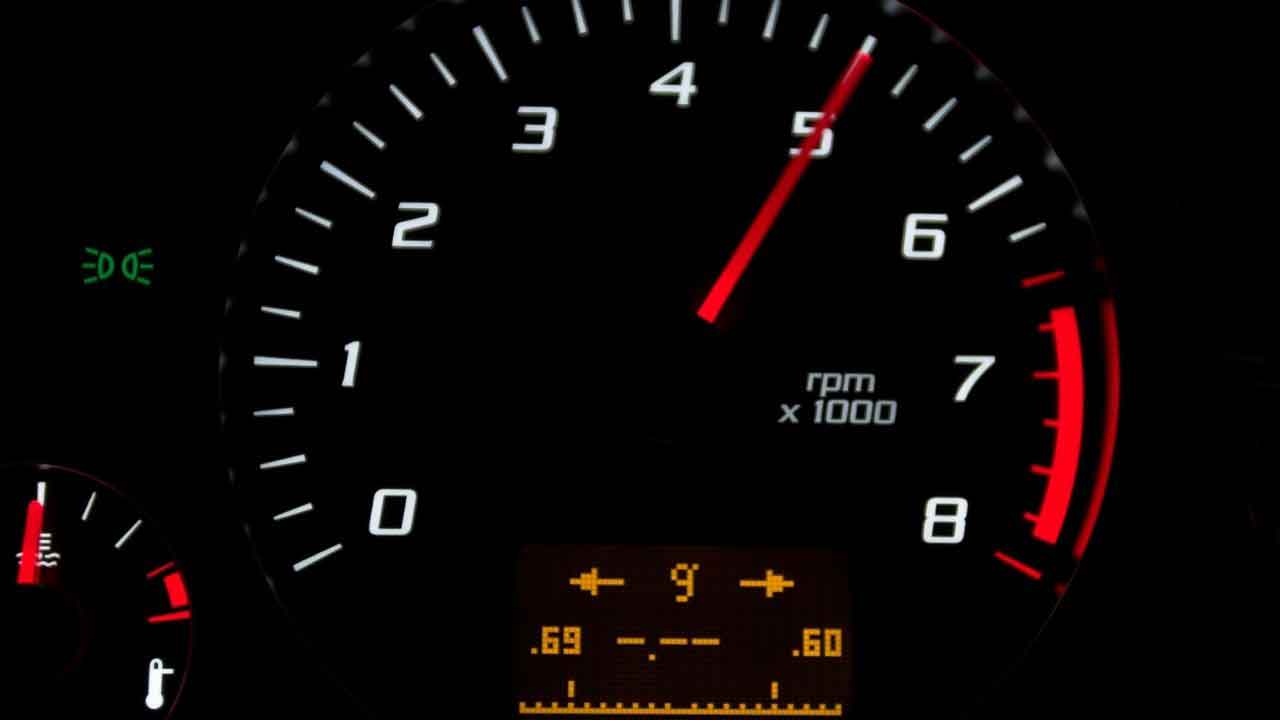Not driving the vehicle for too long or having a parasitic draining element in your car can leave your battery dead.

Although you can jump start your car with a jump box and start driving instantly, it is good to charge the battery fully with an external charger to keep the battery healthy.
So, we have covered a wide range of car battery charging topics in this article to give you a comprehensive idea so that you don’t need to go anywhere else to find an answer to your query.
This article includes topics from how you can charge a lead-acid car battery, how long to charge it at 50 amps, 40 amps, 30, 20, 10, and even 6, 4, and 2 amps, and determining factors of charging time, charge time calculation method, and many more!
How to Charge a Car Battery?
Charging a car battery is easy and almost effortless. Take the battery charger, turn its switch off to be safe from sparks.
Now, find the positive and negative cable of the battery charger, typically positive one is marked red, and the negative is black. Connect the positive cable to the positive battery terminal and the negative cable to the negative terminal of the car battery. And you’re done!
The only thing you need to do now is turn on the battery charger and leave it to charge your car battery.
Always use an automatic charger to keep your battery in good health. Car batteries can get damaged due to the overcharge and automatic charging devices stop charging as soon as the battery is fully charged. Plus, some monitor battery temperatures as well to maintain a good charging flow without damaging the battery.
How Long Does it Take to Charge a Car Battery from Dead?
Before we provide you with some direct answers to the questions, we should share with you the way things work. This will help you to determine the time again at future date without searching the internet.
Time to Charge a Car Battery: Determining Factors
How long will it take to charge your car battery depends on various factors, here are some of those-
1. Charging Speed
The more power you are giving your battery at a given time, the faster it will charge. This is a universal fact about batteries. However, where batteries can charge very slowly, you can’t speed it up lightning-fast always.
Generally, car batteries can be charged at a rate of 2 amps, 4 amps, 6 amps, 8, 10, 12, 20, 30, 40, and 50 amps.
However, batteries come up with certain limitations on charging speed. We will discuss this later in this article.
2. Battery Capacity
Battery capacity is another key factor for determining the amount of time you will need to fully charge a battery. A simple example should make things clear for you. At the same water flow from the faucet, a 20-liter bucket will take a longer time than a 10-liter bucket to be filled.
The same is true in batteries also. a small 30 AH battery will take less time to charge fully than a 48 AH standard-sized battery.
3. Operating Temperature
Heat and cold are two great enemies of the car battery. And when you are charging the battery, its internal chemistry surges the temperature in the battery slightly. While a slight surge in temperature is normal when charging the battery, the temperature must be maintained at a limit so that the heat does not damage the battery.
To combat the heating problems in car batteries, especially in summer, smart chargers decrease the current flow to the battery making the charging time lengthy.
4. Charger Efficiency
How much efficient is your battery charger is another determining factor of the amount of it will take to fully charge your battery. You will find many types of car chargers and all of them fall in either the category of trickle charger or the float charger.
The principal difference between these two is the trickle charger will keep charging your car battery no matter your battery is full or dead, but a float charger will charge your battery till it is full and stop charging the battery to prevent overcharging and damage.
In short, float chargers act smartly to save your battery and don’t require you to monitor the charge level manually. But trickle chargers are not smart and will damage your battery unless you monitor the charge level frequently and disconnect it when the battery is full.
5. Battery Quality & Age
Battery age and its quality is another determining factor. Typical car batteries are supposed to last 4 years, although we have found only 30% of car batteries reach that 4 years mark before getting unusable.
You should start feeling battery degradation after a year of usage and it will become weaker every day before it is dead forever.
Like the lifespan, charging speed also gets affected by ordinary usage. A brand new battery will get charged more efficiently than a degraded old battery.
6. Charge Remaining in the Battery
How much is left in your car battery is another key determining factor in the next charging time. For example, if a completely dead battery requires 10 hours to charge, that battery will take 5 hours to be fully charged when there is already a 50% charge left in it.
So, this is another key thing to check when determining the time to charge the battery.

Now, how do you know the amount of charge left in your battery? Figuring out the amount of charge left in your auto battery is simple.
Take a multimeter to measure the voltage of the battery. Connect the positive lead of the meter to the positive terminal of the battery, and the negative lead to the negative terminal. Now, check the voltage readout.
If you get a 12.6-volt readout, you have at least a 75% charge in the battery. 12.3 or less means you have around 50% charge left in the battery and 12.00 means you have 25% charge left. If you get 10 or 11 volts, then your battery is completely discharged.
|
Battery Voltage | Charge Percentage Left* |
|---|---|
| 12.6-volt | 75 to 100% |
| 12.3 or less | 50% to 70% |
| 12-volt | 25% to 40% |
| Less than 12 volt | 0% to 15% |
* Approximate percentage of charge left in the battery.
How to Calculate Battery Charging Time?
You need to know the exact capacity of your car battery to calculate the time to charge. We need the capacity in Amp-hours. But very few automotive battery manufacturers would tell you this data directly.
Although you don’t have exact amp-hours written in the battery, it should have a reserve capacity written on the label. We will figure out the amp-hours from that.
Multiply the reserve capacity by 0.6 to get amp hours of your battery.
For example, if your battery has a reserve capacity of 200, it has a 200×0.6=120 Amp-hours capacity.
FYI, typical car batteries come with a 48 Amp-hours capacity. That means it will last 48 straight hours if you draw 1 amp current continuously from it.
Please note that the time here is theoretical and it will vary depending on other relevant factors.
Converting CCA to Amp Hours
As we have shared with you a method to convert reserved capacity to amp hours, you should be able to calculate things pretty easily. However, your battery label may include cold cranking amps, instead of reserved capacity.
So, divide the cold crank amp by 7.25 to find the amp hours value.
Suppose, your battery has a cca value of 850. Your battery amp-hours should approximately be 500/7.25=69 amp hours.
N.B. the amp value won’t be exact in this method. But you will get a rough idea about the capacity of your car battery.
How Long to Charge a Car Battery at 2 Amps?
A typical 48 AH car battery will take 24 hours to get fully charged from dead at 2 amps charging rate.
A more heavy-duty battery having 72 AH capacity will take 36 hours to fully charge from dead, and 18 hours from 50% to 100%.
Well, you may have already been thinking of a more fast charging option. But deep cycle batteries perform best when charged slowly. It keeps the internals of the battery in good shape to give you long-lasting service.
How Long Does it Take to Charge a Car Battery at 4 Amps?
As we have already shared with you the calculation method, it should be easy for you to find out the exact time a battery needs to be fully charged at 4 amps.
Standard 48 AH car battery will take 12 hours to get to the 100% mark from dead.
If you feel the 2 amps charging rate is too slow, you may try at 4 amps to speed it up without causing any major effect on battery lifespan.
Generally, lower than 10 amps are considered slow charge and is recommended for getting better battery service in the long run.
How Long to Charge a Car Battery at 6 Amps?
A 48 AH car battery will take 8 hours to get fully charged from dead when charged at 6 amps. However, the time may vary slightly for some other factors as well.
If your battery is one with 72 AH capacity, that will take around 12 hours to reach 100 percent from dead.
Now that we have shared with you the calculation method and time to a full charge of 3 different battery charge rates, you should be able to figure out the estimated time to fully charge a battery faster than ever. To make your job easier, here is a table-
| Charge Rate (Amp) | Full Charge From Dead* | 50% to Full |
|---|---|---|
| 2 Amp | 24 Hours | 12 Hours |
| 4 Amp | 12 Hours | 6 Hours |
| 6 Amp | 8 Hours | 4 Hours |
| 10 Amp | 4 Hours 48 Minutes | 2 Hours 24 Minutes |
| 20 Amp | 2 Hours 24 Minutes | 1 Hour 12 Minutes |
| 40 Amp | 1 Hour 12 Minutes | 36 Minutes |
| 50 Amp | 1 Hour | 30 Minutes |
* Considering a 48 Amp hour capacity standard and healthy car battery. The time may vary slightly.
How Long Does It Take To Charge A Battery While Driving?
How much time it will take your battery to fully charge when driving depends on your engine revolutions per minute.

The rule of thumb is the more you rev up your engine, the faster it will rotate the alternator and charge your car battery.
Generally, a healthy car battery should get charged within 30 minutes when you drive on a highway and will take an hour in city streets. However, the charging time can vary a lot depending on your engine RPM.
Will Car Battery Charge When the Engine is Idle?
A car’s electrical system is designed to accept energy from two sources – the alternator and the battery. In a sense, you can think of an alternator as being a generator for vehicular power while a battery is an onboard storage unit.
It’s important to understand that the energy generated by the alternator flows directly into all of the other crucial components such as your engine, lights, ignition system, etc… without storing any excess outside of those devices. But it’s best if we talk about this in terms of how long will car battery charge. When a vehicle sits idle with no demands being placed on its electric systems (no engine running), then yes – your battery does recharge itself quite nicely!
However, if the alternator is not operating, then it won’t charge the battery.
How Quickly Should I Charge My Car Battery?
Now, the moment of truth! Although we have already shared with you that the car batteries perform best when they are charged slowly. But how slow? That’s what we are discussing here.
We recommend using a standard 2 amps battery charger with smart power maintaining capability so that it does not overcharge your healthy battery and damage it.
Overcharging creates hydrogen sulfide inside the battery that can cause explosion or fire accidents. So, be careful about that.
However, it may not always be possible to wait a full 24 hours period to fully charge the dead car battery. In such cases, you can increase the charge rate by using 4 amps or 6 amps charging devices. This will speed up the charging process and save several hours.
Charging a depleted battery faster will make more damage to it. So, we don’t recommend this for weak and old batteries. You should use fast charging occasionally with a properly working battery when needed.
LED bulbs are great for reducing stress on your car battery. Although cheap components can take significant amount of charge from the battery, best rear view mirror dash cams or a top quality set of car speakers are easy on your battery.
Car Battery Charging Tips & Tricks
Here are some of the key things that you should be careful of when charging your car battery with an external charging device.
1. Monitor the temperature of the battery while charging to avoid damage to it. The internals of the battery heats up a bit when they are getting charged. While a bit of heat is normal, overheating can cause fire or an explosion.
2. Always use an automatic or smart charger to refill the battery power. Using a manual charger is too much hassle as you need to monitor the charge level and battery voltage manually to prevent overcharging. Automatic chargers are not so expensive and they work pretty well when you need to charge your car externally.
3. Use protective equipment to avoid contact with battery acid. Battery acid can cause serious burns to your skin. Use eye protection as well to be on the safe side.
4. Keep the battery firmly attached to the car to avoid any physical damage to the battery. Car batteries contain lead-acid and they can cause a serious problem if physically damaged.
5. Use quick charge for a very short period in emergencies. Quick charge is not good for car batteries and reduces the lifespan.
6. Use a quality charger and connecting cables to avoid short circuit.
7. Don’t ignore check engine light or battery warning light. Especially, when you have done something in the engine bay or with the battery.
How Long Will My Car Batteries Last?
The lifespan of your car battery will depend on the type you buy as well as how it’s used. It may also vary based on environmental factors such as cold weather and hot temperatures since these can affect the charge density needed to work properly.
The average lifespan for most sealed lead-acid batteries is between 4 and 5 years with some lasting up to 10 years if they are not abused or overcharged excessively while in regular use.